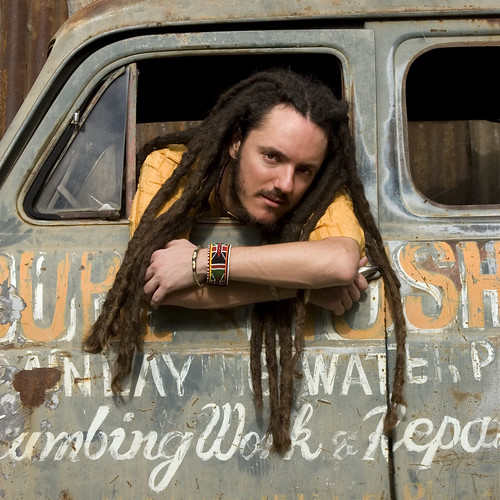Thomas Mapfumo, the great musical hero of Zimbabwes war of independence, now lives in the US. So too, after a relationship with Germany, does Chiwoniso. Oliver Mtukudzi is in South Africa. Are there any musicians remaining in Zimbabwe and daring to raise their heads above the parapet?
Well, yes hes called Comrade Fatso and his debut album, House of Hunger (released in 2008 on Magamba) is, naturally, banned by President Robert Mugabes government.
Not that Fatso is fazed by this. House of Hunger is banned in Zimbabwe because its part of the many truths that fly in the face of ZANU PF propaganda, he says. We joke about it a lot. Were the banned band! But nonetheless we play our music in Zimbabwe, from bars to communities, from cafés to festivals. Our music is there to incite people to act. Its food for freedom fighters. Yes, its banned on radio and TV. Yes, we get monitored and intimidated. That obviously means that our musics got the right message.

Comrade Fatso actually Samm Farai Monro derives his nickname from a complicated pun on farai (the Shona word for happy) while the comrade bit is a cheeky stab at Mugabe himself. Specializing in a slam poetry that marries hiphop with a political activism focussed on Zimbabwes sorry state, House of Hunger burns with a righteous ire.
Advert
Calling himself the toyi-toyi poet, after the subversive, stamping dance that Zimbabwe loaned to apartheid-era South Africa, Fatso recorded the album in Johannesburg with his band Chabvondoka. There are guest slots from Chiwoniso (whose 2008 Cumbancha, album Rebel Woman was also critical of Mugabe) and fellow hiphopper Godobori. Fatsos self-financed album is one of raw poetry, suffused with all the energy of the best garage band rock.
Chabvondoka means Its a riot, says Fatso. Thats exactly what our music is. A riot by young Africans intoxicated with freedom thoughts. Weve been creating together and raising hell for the last three years. And well only stop playing when we have the last despot hanging from our guitar strings.
Fatsos influences are manifold: Fela Kuti, Thomas Mapfumo, Linton Kwesi Johnson, Public Enemy. Born in Britain in 1980 to social activist parents whod temporarily left Rhodesia, Fatso has lived most of his life in Harare: fluent in Shona, his life away from the stage is spent working at Magamba, a multicultural arts organisation with young Zimbabweans as its client group. All of which means that Fatso is able to, as the adage goes, tell it like it is. In one poem, The Word is a Bird, he writes: Some say silence is golden/ But silence is shit/ Cause words can hit/ But they can heal/They can liberate us from what we feel/Cause mazwi acho akasimba/Anogona kutibatsira kwatirikuenda / Cause words are warriors/And their great gifts are glorious.
In fact, Fatso follows in a distinct tradition of musical activists in Zimbabwe. The war for independence against Rhodesia was fought to a soundtrack that was dominated by Mapfumo, whose Shona lyrics (sample: Mothers send your sons to war) often ducked under the radar of the authorities. In fact, it was Mapfumo who coined a phrase for his electric guitar-driven, mbira music, chimurenga, meaning struggle.
It says something about the current state of the country that Mapfumo has lived abroad ever since his 1989 album Corruption came out, and where struggle is now against those who successfully prosecuted the independence war. Still, Fatso is undeterred, and its not just Mugabes excesses that come into his songs sightlines. Educating outsiders about how the West buoys up the Zim economy and does nothing for the countrys healthcare Aids is endemic is also important.
Its these kinds of criticism that have got Fatso and his band watched. Luckily, nothing bad has happened, perhaps because the government goons who come to his gigs are easy to spot in their Blues Brothers disguises, but the danger is present none the less. But Fatso has no intention of leaving. Im based in Zimbabwe, our mad beautiful country, he says. But me and the band are on tour every month spreading our subversive verses to the US, South Africa, Tanzania and elsewhere.
House of Hunger is available online at www.comradefatso.com
Louise Grays new book The No-Nonsense Guide to World Music is available from New Internationalist http://www.newint.org/publications/no-nonsense-guides or any good bookshop.
*chimurenga Shona for struggle






